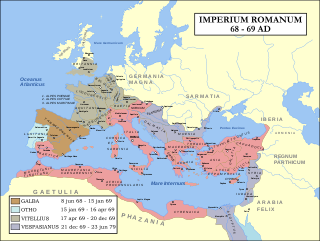Related Research Articles

AD 69 (LXIX) was a common year starting on Sunday of the Julian calendar. In the Roman Empire, it was known as the Year of the consulship of Galba and Vinius. The denomination AD 69 for this year has been used since the early medieval period, when the Anno Domini calendar era became the prevalent method in Europe for naming years.
Year 175 (CLXXV) was a common year starting on Saturday of the Julian calendar. At the time, it was known as the Year of the Consulship of Piso and Iulianus. The denomination 175 for this year has been used since the early medieval period, when the Anno Domini calendar era became the prevalent method in Europe for naming years.
Gaius Avidius Cassius was a Syrian Roman general and usurper. He was born in Cyrrhus, and was the son of Gaius Avidius Heliodorus, who served as praefectus or governor of Roman Egypt, and Julia Cassia Alexandra, who was related to a number of royal figures, including her descent from both Augustus and Herod the Great. He began his military career under Antoninus Pius, rising to the status of legatus legionis. He served during the Parthian war of Lucius Verus, in which he distinguished himself, for which he was elevated to the Senate, and later made Imperial legate. During the Bucolic War, he was given the extraordinary title of Rector Orientis, giving him Imperium over all of the eastern provinces of the Roman Empire.
Sabinian or Savinian may refer to:
Marcus Vettius Bolanus was a Roman senator and soldier. He was suffect consul for the nundinium of September-December 66 as the colleague of Marcus Arruntius Aquila.
Vettius Valens was a 2nd-century Hellenistic astrologer, a somewhat younger contemporary of Claudius Ptolemy.
Publius Vatinius was a Roman politician during the last decades of the Republic. He served as a Caesarian-allied plebeian tribune in the year 59 – he was the tribune that proposed the law giving Caesar his Gallic command – and later fought on that side of the civil war. Caesar made him consul in 47 BC; he later fought in Illyricum for the Caesarians and celebrated a triumph for his victories there in 42 BC.

The persecution in Lyon in AD 177 was an outbreak of persecution of Christians in Lugdunum, Roman Gaul, during the reign of Marcus Aurelius, recorded in a contemporary letter preserved in Eusebius's Ecclesiastical History, book 5, chapter 1, which was written 150 years later in Palestine. Gregory of Tours also describes the persecution in the 6th century in De Gloria martyrum.
Prætextatus or Praetextatus may refer to:
Vettius Agorius Praetextatus was a wealthy pagan aristocrat in the 4th-century Roman Empire, and a high priest in the cults of numerous gods. He served as the praetorian prefect at the court of Emperor Valentinian II in 384 until his death that same year.
Vettius Agorius Basilius Mavortius was a Roman aristocrat who lived during Ostrogothic rule. He was appointed consul for 527.

Gaius Vettius Sabinianus Julius Hospes was a Roman military officer and senator. He was born into the equestrian order, possibly in North Africa. He held the traditional series of military, administrative and judicial positions of steadily increasing responsibility which aspiring upper class Romans were expected to progress through, known as the cursus honorum. He had a long and distinguished military and political career under the reigns of the emperors Antoninus Pius, Marcus Aurelius and Commodus.
Gaius Vettius Gratus Sabinianus was a Roman senator who was appointed consul in AD 221.
(Gaius) Vettius Gratus was a Roman senator who was appointed consul in AD 250.
Gratus, possibly named Gaius Vettius Gratus, was a Roman senator who was appointed consul in AD 280. Gratus was probably the son of Vettius Gratus who was consul in AD 250. Gratus himself was appointed consul posterior alongside Lucius Valerius Messalla in AD 280.
Lucius Licinius Lucullus was a politician of the Roman Republic, being the son of Lucius Licinius Lucullus. He did not, however, achieve the political success of his father and failed to hold the consulship, reaching only the position of praetor in 104 BC. During his praetorship he first successfully put down a minor slave revolt in Campania before being sent to take command in Sicily during the Second Servile War. He was later relieved of his command and prosecuted for embezzlement upon his recall to Rome. Being convicted, he was banished from the city and lived the remainder of his life in exile. He is the father of the more famous Lucius Licinius Lucullus, who defeated Mithridates and Tigranes in the Third Mithridatic War.
Apollonius was one of the principal leaders during the revolt of the slaves in Sicily, which had been brought about by one Titus Vettius, in 103 BCE. The Roman Senate sent Lucius Licinius Lucullus with an army against him, and by bribes and the promise of immunity he induced Apollonius to betray the other leaders of the insurrection, and to aid the Romans in suppressing it.
Gaius Vettius Cossinius Rufinus was a politician and senator of the late Roman Empire.
Lucius Vettius was a Roman equestrian informer who informed on the Second Catilinarian conspiracy in 63 BC and later, in 59 BC, denounced a supposed plot of many conservative-leaning senators to murder Pompey. He was jailed and then found dead.
References
- ↑ Diodorus Siculus, Library of History, Book 36, ch.2